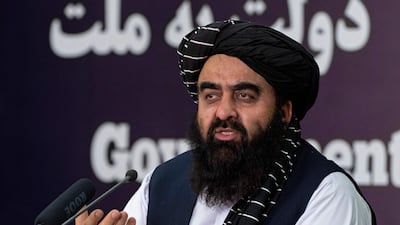Afghan activists are calling for an investigation into British imams who met Taliban ministers amid fears they could have been influenced by the regime’s strict ideology.
Hundreds of people including women’s rights campaigners and former Afghan politicians have signed a petition calling for an investigation into the eight-day “fact-finding mission”.
The delegation, which included imams and Islamic scholars from London, met high-ranking Taliban officials including the group's foreign minister, Amir Khan Muttaqi, and Mohammad Khalid Hanafi, head of the Vice and Virtue Ministry.
‘Dangerous and chilling’
Zalmai Nishat, an Afghan researcher living in the UK, told The National that the risk of engaging with the Taliban cannot be underestimated.
The programme lead for Central and South Asia at the Tony Blair Institute, whose participation in the campaign is being undertaken in a personal capacity, warned the delegation could fall into a trap and end up adopting the Taliban’s “violent, extremist interpretation of their religion”.
“It’s dangerous and chilling,” Mr Nishat said. “The British authorities need to be aware of this. We are calling on the Home Office, the Charity Commission and counter-terror police to investigate.

“I stand for human rights, freedom and democracy. I am fighting for these values. [The Taliban] stand for totalitarianism.”
Mr Nishat also voiced fears that the imams may share the Taliban’s view that Western influence should be expelled from education.
In undertaking the visit the group appears to be trying to “justify the politics of the Taliban”, he said.
Remarks made by the visitors suggested the Taliban closed the girls’ schools because they need to revise and Islamise and Afghanise the curriculum. Mr Nishat called the language controversial and described comments as “silly generalisations”.
“They think that the education system in Afghanistan has been influenced by the Western system of knowledge and see it as Western colonialism.
“Afghanistan is a very diverse culture – it’s not just a culture, but cultures. The Taliban cannot represent the Pashtun culture, let alone the diverse communities of Afghanistan.”
Mr Nishat, who is originally from a district north of Kabul, said there is a risk that all UK-based imams could be tarnished by the actions and associations of a few.
“Everyone will be lumped in the same camp of radical imams like them,” he warned. “I think if these imams are not looked into the implications will be dangerous. Imams from the US, Germany, Australia and other countries could adopt some sort of radical reading of the religion.”
Ali Maisam Nazary, head of foreign relations for the National Resistance Front of Afghanistan, said he was “deeply concerned” by the visit, and accused the imams of “effectively normalising the Taliban terrorists’ reign of terror and tyranny”.
'Building bridges between two worlds'
The trip, which started at the end of July and concluded in early August, was led by Human Aid & Advocacy, which, in a Charity Commission listing, describes itself as a group that “supports survivors of war and persecution through sustainable aid programmes”.
The east London-based body said they organised the visit to Afghanistan “in co-ordination with a fact-finding mission led by Prosper Afghanistan”, a group which it described as “a community initiative dedicated to furthering understanding of Afghanistan”.
Prosper Afghanistan said the imams and Muslim scholars “hold a unique position that grants them a vantage point and an ability to build bridges between two worlds that they know well.”
In a statement issued to The National, Human Aid & Advocacy said the group undertook the trip “to better understand the humanitarian needs of the Afghan people and witness some of the current aid projects established by Human Aid & Advocacy in the country.”
They said they had funded an orphanage, a widows’ skills training centre, vocational training and aid deliveries.
More than 700 people have signed an online petition backed by Mr Nishat that calls for an investigation into the tour. These include Anarkali Honaryar and Naheed Farid, both former MPs in Afghanistan.

Following the tour, Human Aid & Advocacy pledged support for a primary school in Paghman, a town west of Kabul, where 100 pupils are being educated.
In September 2021, weeks after retaking power, the Taliban banned girls from accessing high school education. This was followed by a ban on university education for women in late 2022.
Local Taliban officials in some areas are understood to have brought the age limit for girls' education down to 10.
A representative for the Home Office in London said: “We do not routinely comment on individual cases.”
London's Metropolitan Police said the force has not received any allegations of criminality in relation to the claims made in the petition.
The Charity Commission has been contacted for comment.


